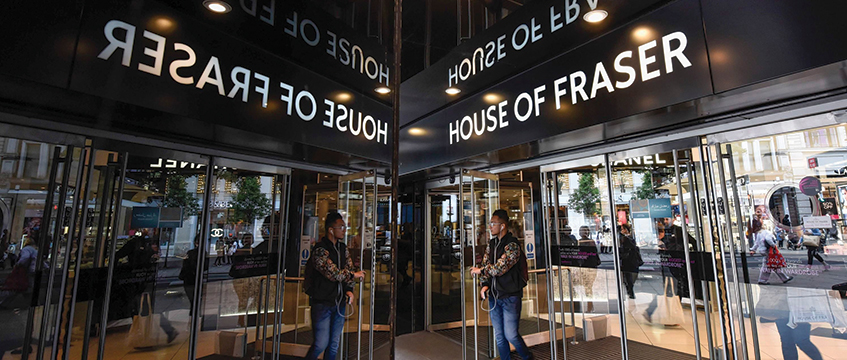Cast your mind back to the halcyon days of 2013.
That April, House of Fraser opened its first overseas store in Abu Dhabi. A month later it reported a small pre-tax loss. Yet with online sales up 53% – accounting for 11% of turnover – there were grounds for optimism despite the already apparent challenges on the high street.
Rapidly expanding estate agency Countrywide, meanwhile, was basking in a “glow post IPO”, according to an EG headline that August.
EBITDA was up 35% to £26.4m, with growing divisions throughout the group. Its recent £220m IPO raise had seen it slash net debt from £203.2m to £22.1m.
Buoyed by residential success, a month later it would acquire Lambert Smith Hampton, with the expressed intention on capitalising upon “a wealth of new opportunities, fresh investment, economies of scale and expertise”.
Fast forward five years and both firms are fighting for their lives.
Countrywide’s shares are down from 605p in August 2013 to 16p at the time of writing, after a planned £140m capital raise sent its share price tumbling a further 60%.
No less calamitously, House of Fraser’s potential acquirer, Hamleys owner C.banner, has walked away from a rescue. It had planned to take control with a £70m cash injection.
Countrywide is buckling under net debts of £212m after failing to raise £250m through a bond issue earlier this year. House of Fraser is in technical debt default of its borrowing. For too long both companies have fiddled while their loans burn.
Retail and residential market weakness, poor decision making and structural change have all played a part in putting the two businesses in a position where survival appears less likely than collapse.
Crises for these businesses, yes, but good can come of this for others if lessons are learnt quickly.
The inclination to kick the can down the road – and the tolerance of businesses that do so – has to come to end. Delay has destroyed an awful lot of value in Countrywide and House of Fraser.
It is simply delusional to hold out endlessly in the hope that a cycle will turn, to cling on to a belief that structural change is avertable rather than inevitable, to hold fast to a conviction that a white knight is always waiting to be found.
Plenty of investors and owners of real estate have been able to avoid writing down values for years, but it can’t be wise to continue to do. Assets have been sat on when radical action is the only potential salvation.
There is resilience in London offices, as our LOMA report shows (p30), but don’t assume that resilience holds for every part of the market – especially retail, but large swathes of the office and resi markets too.
Contrast this sitting-on-hands behaviour with the Bank of England this week. It raised interest rates 25 basis points in the face of economic weakness. It’s a risky move, but the bank is doing so because inflation remains stubbornly, and employment encouragingly, high. The bank is inflicting a small amount pain now in the hope that there will be fewer casualties later.
Just as the catastrophic execution of Brexit will be on the curriculum at the Civil Service College for decades to come, House of Fraser and Countrywide should be on business school syllabuses far into the future too.
Don’t join them.
To send feedback, e-mail damian.wild@egi.co.uk or tweet @DamianWild or @estatesgazette











